Let's Talk About Consciousness - wtf is it?
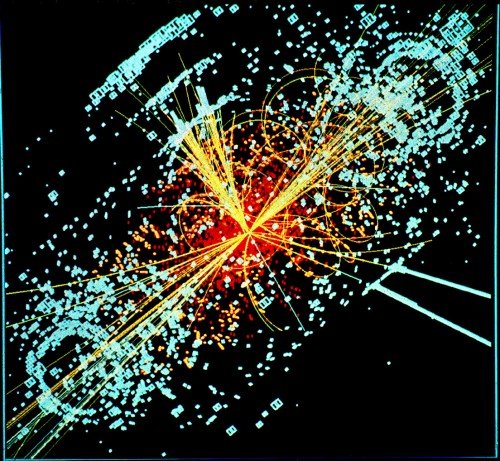
The frontier of physics today is the Grand Unification Theory.
It is an attempt to combine general relativity and quantum mechanics, so that one equation is enough to mathematically describe everything in the universe. Having interest in the subject, I went on pouring through multiple journals, constantly following up on latest developments in the Large Hadron Collider, and always attempting to understand the counter-intuitive and exotic weirdness of quantum physics.
Recently, I've been wondering about the equation for consciousness.
Is there something abstract enough to describe it?
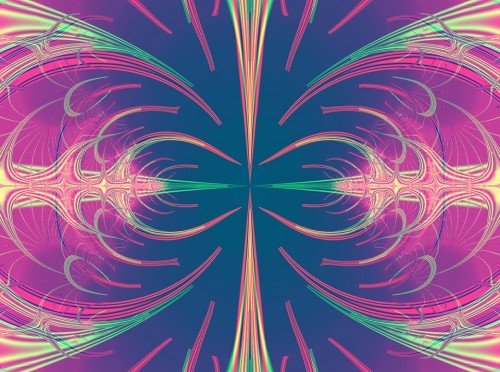
Consciousness is a hard problem.
Going through tons of materials online on the topic of consciousness yielded no interesting insights - the topic seemingly too convoluted for my minimalist mind. Sure there are both theological and cognitive explanations. But these are rather coloured by philosophical assumptions.
Personally, I think subjective consciousness is the same as objective consciousness. There's no real way of telling what you might've thought or acted differently at each slice of time. This is the point of debate when it comes to free-will (which will be my next post). So I took a look at quantum mechanics.
The very nature of quantum mechanics itself cuts deep into the core of fundamental reality. All manner of bizarre occurrences like quantum entanglements and seemingly random quantum states have been tried and tested to be true. All these have been a staple for the inner workings of lasers, MRI scanners and other practical technologies of this century.
Perhaps, the key to understanding consciousness is to pry into our human brain and explain it in terms of neurons and its interactions. It is in my best understanding and opinion (without the need for mathematics and the invocation of theological explanations) to be able to describe consciousness broadly as the experience of the senses, generated by the complex soup of neuronal activities in our brains. The sum of the neuronal activities in your brain at any given point in time is exactly the sum of your conscious experience and subconscious processes.
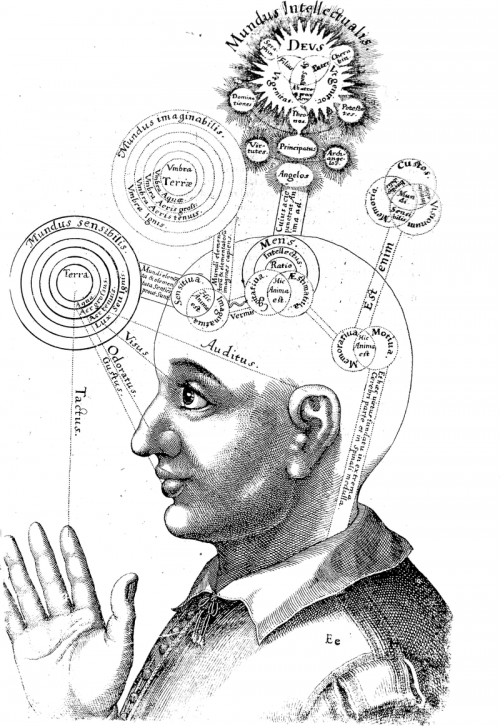
The deep-rooted problem with this have always been in the very nature of consciousness trying to understand consciousness itself.
Any theory about our consciousness cannot disregard the fundamental reality itself as described by both general relativity and quantum mechanics. So the only way for it to be understandable, it must fall within a combination of both scale-adaptive equations. The two major reasons to think of consciousness in this way:-
- Our immediate consciousness works within the realm of general relativity
- Our brain's neuronal activities fall within the realm of quantum mechanics
To bridge the gap between the nature of neuronal activities giving rise to our consciousness, there has to be a link between both concepts of time-space and wave-particle. Another consideration for the nature of consciousness is to have the speed of light taken into account as well, for it is the speed of information transmission - neuronal activity. This perhaps could only be solved by De Broglie's equation, a formula that could accommodate the understanding of both realms in this fashion:-
- E = hv (E being energy, h being Planck's constant, and v being frequency)
- Wavelength is inversely proportional to the momentum of a particle, or more simply explained as λν = c (λ being wavelength, and c being the speed of light)
- Frequency of matter waves is directly proportional to the total energy E (sum of its rest energy and the kinetic energy) of a particle
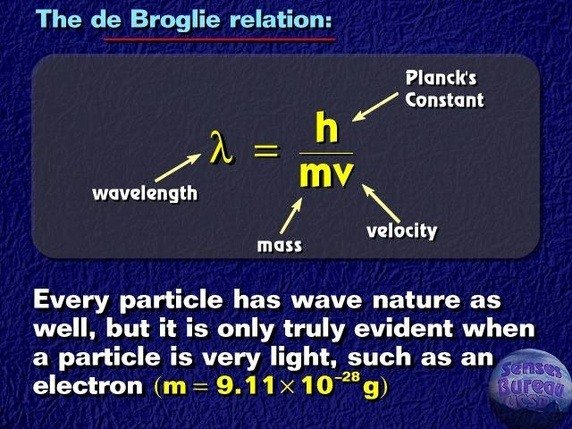
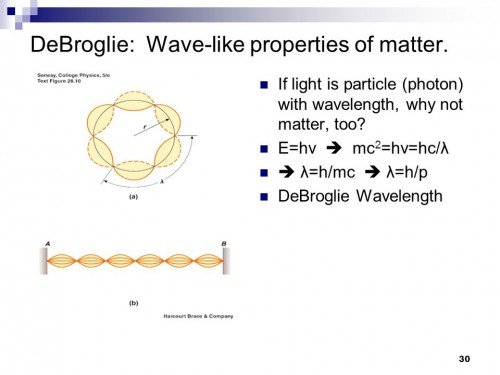
Without elaborating much onto the radio nature of our brains, De Broglie's equation is in line with the understanding that our particulate neuronal activities generate brainwaves, with its major waves being dubbed as alpha, theta, and gamma, as you may have heard. In quantum mechanics, each particle has its own field of effect. This is certainly not science fiction, as there are already plenty of brainwave applications being implemented these days.
To formulate a consciousness in conjuction with De Broglie's equation, an understanding of the big and the small must be established.
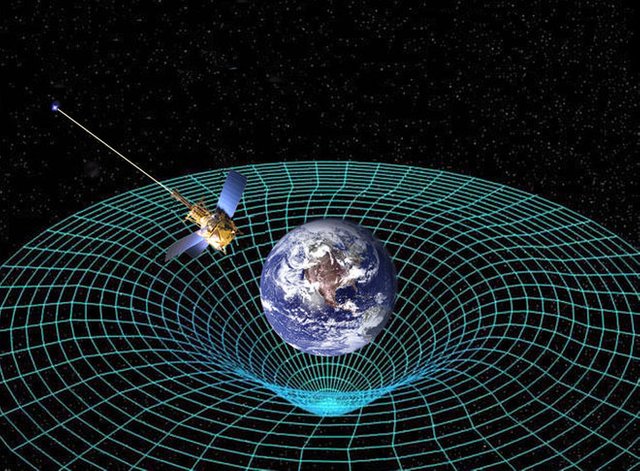
The four important things to keep in mind when trying to understand general relativity:
- The frame of reference regards the concept of space and time
- The speed of light is fundamental to space and time
- As the name of the theory implies, space and time is relative
- Our consciousness are suited for perceiving the effects of general relativity simply because we have evolved as a fairly large-scaled organism.
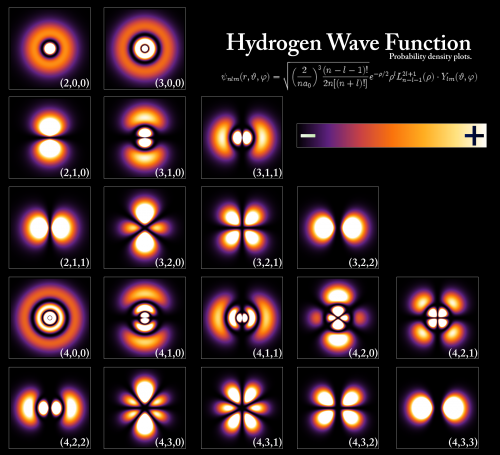
The four important things to keep in mind when trying to understand quantum mechanics:
- The frame of reference disregards the concept of space and time
- Space and time could be replaced with interference and coherence
- Waves are really like particles, and particles can also be like waves
- Our consciousness are not suited for perceiving quantum physics simply because we have evolved as a fairly large-scaled organism.
By combining the understanding of general relativity with quantum mechanics, I think I may have arrived at wet-market equivalent of the equation of consciousness. The following equation is in no part of any philosophical and theoretical consequence, but instead, it comes in part of quantizing all matter and energy in the form of De Broglie's equation for wave-particle duality:-
In the end, our consciousness could be mathematically expressed in terms of brain function. It comes back full circle as the expression of energy.
Cnow = h x f
In which Cnow is the unit of your conscious experience at this infinitesimally small moment in time (that can't even be defined by moment, but rather, your mind's interaction in regards to the illusive space-time continuum), h being Planck's constant, and f being the unit of frequency. What does this really mean?
The easy one to look at is the conscious experience that occur during life and death. The concept of life itself is an accumulation, an abstract construction of Cnow and the previous Cs in which is subject to the wave-particle fluctuations in part of your neuronal activities. Death is zero fluctuations, zero frequency, the death of the brain implying zero consciousness, which well, makes sense.

Here's the interesting part: h, being Planck's constant, a quantum of action, can be equated to h = 6.6262 x 10^-34 J.S. Our average brain activity takes up about 400 calories = 1670 Joules per day. This means the cost of your consciousness amounts to roughly 0.02 joules in a quantized instant. This really means that an average of 30 nonillion (30 followed by thirty zeroes) fluctuations happen in your brain in a in a quanta to give rise to your consciousness.
Roughly assuming that the total number of neurons in the brain being used up in a second is 50%, the average fluctuations per neuron amount to 0.6 quintillion (6 followed by 20 zeroes) per quanta. Your consciousness, if quantized, could still be only resolved into a continuous stream of experience. Simply because our consciousness could only perceive such an experience without any discontinuity.
0.6 quintillion fluctuations per quanta is a mind-boggling amount, considering that modern CPUs only currently work in the gigahertz level. And that's gigahertz, which is in per second! Our brains are at least a trillion trillion trillion times faster in performance. If you consider the richness of your consciousness. Try now - switch the channel(s) of your "consciousness" and query the following:-
- ability to resolve reality with incredible detail and depth
- ability to have an imaginative mental life
- ability to experience through multiple senses at the same time,
- pattern and prediction modules running at background and foreground
- your behavioural daemons running silently to keep your body in check
.. it's no wonder that our brains are immensely capable machines.
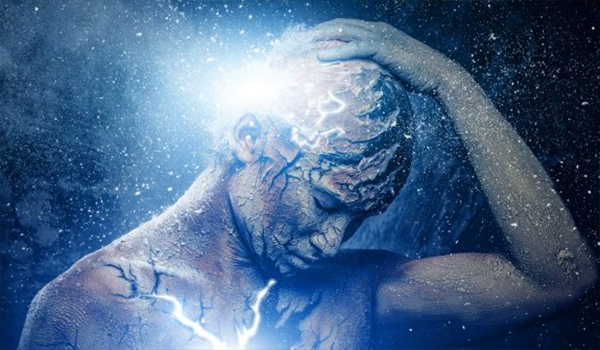
To keep this formula in check, let's revisit De Broglie's formula E = hv, which after
playing around with other formulas ends up being C = h x f (which is essentially the same), remember Einstein's equation of E=m x c^2. Plugging in, it yields to be C = m x c^2. The speed of light is a large number, hence the mass will be a very small number. How small? Quantum physics kind-of small, which relates to the neuronal states of mass and energy, or particles and waves.
In a way, our unit of consciousness C is in proportion to the number of neurons that we have. Incidentally, the human brain contains the most neurons in the animal kingdom (and most saturated too). The lower the C, the lower the level of your consciousness. A bacterium that only has the consciousness of 1 unit to detect light and dark inadvertently contains only low amounts of fluctuation in its brain, which probably doesn't allow for it to be sentient and be aware (in the sense of free-will).
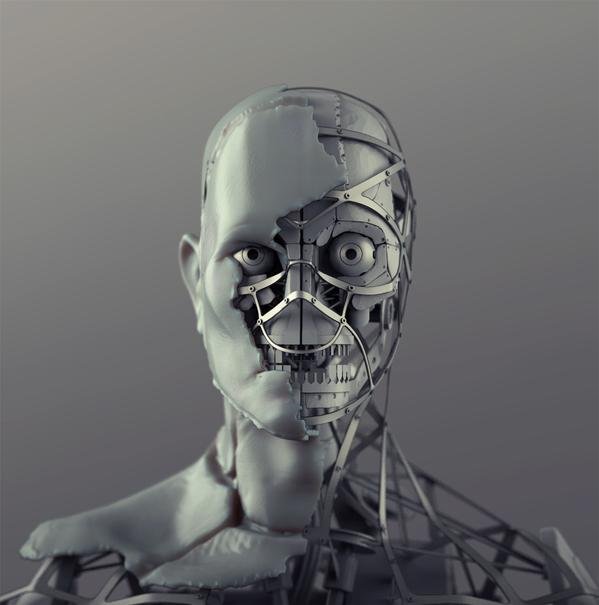
One final musing
Will artificial intelligence ever come to a point that it attains the kind of consciousness that we have? The formula C = h x f shows that a high amount of fluctuations are required to simulate the kind of consciousness that we have. Software usually only operate in series, not in parallel. A series system implies unity. A parallel system implies chaos, which really represents the structure of our brain and its internal neuronal connections. So in a way, robots need to have an immense network of parallel-type systems to simulate our kind of consciousness (emulating our ability to cross-disciplinary connections).
While this isn't a necessarily practical or a life-changing equation, it says plenty about our consciousness in a simple mathematical form that in my opinion, obeys the laws that govern our universe. It doesn't contain any form of meaning and purpose in attachment to our consciousness, because there's no way of quantifying them into fundamental mathematical equations.
So wtf is consciousness again? I don't know man. Maybe it's not even the right thing to ponder about. For me, the entire state of your brain is your consciousness, and you experience consciousness frame-by-frame.. as time pushes you forward (rudely) without your permission.

It's fascinating how, basically, our brain cannot figure out itself. We are conscious about our consciousness, but cannot understand our consciousness.
I remember reading a story on reddit where a person was having a surgery that involved her brain being visible, so she had asked her doctor to take a picture of it.
Its like the person was asking a selfie of her true self. :P
The true self is the heart, not the brain. The heart takes information from your environment. your brain takes information from your heart as well as the rest of your body.
LOL :)
I think, therefore I am, or so I thought.
consciousness doens't "come from somewhere".
Believing that something to exist needs to have a cause is already a product of consciousness.
Consciousness is an originary phenomenon. It doesn't need an explaination, but it is the source of explainations.
Maybe for good reason! The show must go on, we can't have the players figuring out the game.
A lot of stuff in this article went over my head since I'm not that into it usually.
But I found it really interesting. Considering they aren't able to "emulate" a human brain into software or hardware yet, because like you stated:
I think we will be able to further expand on our knowledge of conciousness and how the brain really works when quantum computers are up and working. They will probably be able to further evolve the "emulations" we are trying to create today, and AI won't be a far reach after that, I believe.
Really interesting article, gave you a follow to read more stuff like this!
I can't wait for scientists to start using Steemit and announcing new finds and getting rewarded instantly for it. The future is very exciting!
The future is going to be nuts. I'm twenty-eight. When I was ten Nintendo 64 came out, the internet was for weirdos and no one had a smartphone.
Haha, I'm 27 so I can relate to that.
I still remember getting my first PC and being like, wow, my world just opened up in front of me. :P
Thanks man, sometimes I don't even know what i'm writing and yapping on about! Glad that you find it interesting - at least it's entertaining..? i guess.
Yes if we're gonna get true blue scientists gettin' on Steemit to do this that'll be super awesome.. :)
Entertaining to say the least, yes!
Made sure to give you a follow to read more of your entertaining writing/yapping, hehe. :)
This was so awesome and insane at the same time, half went over my head and the other have changed my perception on reality in less than 15 minutes.
@kevinwong: this is one of the best discussions on consciousness I've seen which actually discusses quantum theory without getting all woo in the process. Very well done, sir! I like to think of consciousness as an emergent property of memory, time, and our stimulus / response mechanisms including pain and pleasure. I love these discussions. :)
Emergent property of memory, time, and our stimulus/response mechanism -- man that's a good description, you've packed those words nicely! Glad you enjoyed the piece :)
A guy named PeterWotz wrote a book called blindsite where he postulated that conchessness is an evolutionary fuckup and that perhaps other aliens are intelligent without being conchess. I'd never considered that.
matter arranged in certain ways = bam, conchessness (like the way you spell it!)
I'm blind and a lot of the time if I think I'm close enough I don't spellcheck. Everything is digital these days so I'm reading less braille thus I'm seeing fewer words spelled out so I spell a lot of things phoneticly by default.
The interesting question for me is "Is what it feels like to be human what it is to be human?" There are many people who think our sense of self is an illusion.
@laconicflow I've noticed that when I dictate too. Seems saying con see us ness is the only way to not get conchshells out of it. ;)
Oh, I was typing, I just can't spell.
Thing is, trying to explain consciousness without any "woo" at all, might most likely lead to an incomplete picture.
Consciousness: is it held within the connections in the brain, or in the aura surrounding the entire body?
My logical mind is telling me that it's all in the brain, some of my experience tells me that it's not just in the brain.. : /
A theory of everything is an all-encompassing, coherent theoretical framework of physics that fully explains and links together all physical aspects of the universe. Finding a theory of everything is one of the major unsolved problems in physics. Over the past few centuries, two theoretical frameworks have been developed that, as a whole, most closely resemble a ToE. These two theories upon which all modern physics rests are general relativity (GR) and quantum field theory (QFT). GR is a theoretical framework that only focuses on gravity for understanding the universe in regions of both large-scale and high-mass: stars, galaxies, clusters of galaxies, etc. On the other hand, QFT is a theoretical framework that only focuses on three non-gravitational forces for understanding the universe in regions of both small scale and low mass: sub-atomic particles, atoms, molecules, etc. QFT successfully implemented the Standard Model and unified the interactions (so-called Grand Unified Theory) between the three non-gravitational forces: weak, strong, and electromagnetic force.
Through years of research, physicists have experimentally confirmed with tremendous accuracy virtually every prediction made by these two theories when in their appropriate domains of applicability. In accordance with their findings, scientists also learned that GR and QFT, as they are currently formulated, are mutually incompatible – they cannot both be right. Since the usual domains of applicability of GR and QFT are so different, most situations require that only one of the two theories be used.As it turns out, this incompatibility between GR and QFT is only an apparent issue in regions of extremely small-scale and high-mass, such as those that exist within a black hole or during the beginning stages of the universe (i.e., the moment immediately following the Big Bang). To resolve this conflict, a theoretical framework revealing a deeper underlying reality, unifying gravity with the other three interactions, must be discovered to harmoniously integrate the realms of GR and QFT into a seamless whole: a single theory that, in principle, is capable of describing all phenomena. In pursuit of this goal, quantum gravity has become an area of active research
@kevinwong:
I didn't see any mention of panpsychism. According to Wikipedia:
Panpsychism is my favorite philosophical question to ponder...
All that math is utterly and totally beyond me, but this is a great post. All the questions surrounding conchessness are questions I find super interesting. When I think about it I think that we are our brains, they are our humanity.
Consciousness. I like to think about it sometimes. I'm no quantum physicist or anything - but it's interesting to examine the relationship of space and time, infinite outside ( galaxies, universe, etc) and infinite inside (atoms, electrons, quarks, etc) we have to realize more than one "thing" at the same time is true.
I have no idea what it is.
For example, How am I able to remember a dream while I'm unconscious when it happens. I think it's because there's always different levels of consciousness even when we perceive nothing (unconscious) . With this being said, when our bodies have failed and our neural network is inactive, and the we reach our 'final' unconscious state - does quantum theory allow a 'glimpse of consciousness' to still exist ie; paranormal phenomenon?
As I said before, I have no idea, and now I'm going to take a nap.
ROCK ON DUDE!! Excellent thought provoking post!
-bigedude
I have no idea too, i wish a quantum physicist drops by.. lol. Glad the article has sparked something or two, thanks for spillin' some of your thoughts about the subject here :)
You just blow my mind

Funny how some people just totally ignore cognitive science. You won't find the answers to consciousness in your equations, but in empirical studies fo how the brain works, and how consciousness itself can be predictably altered by altering the workings of the brain. The philosopher Daniel Dennett in his book "consciousness explained" does a great job at providing a model of how consciousness can arise, based on subjective experience, neuroscience experiments and studies on patients with brain damage. Other big names in the cognitive science of consciousness are Gerald Edelman, Douglas Hofstadter, Stanislas Dehaene, Giulio Tononi, and they say really fascinating things, it's worth digging into this whole scientific field. No need for quantum physics here, neuropsychology will help you much more in understanding consciousness.